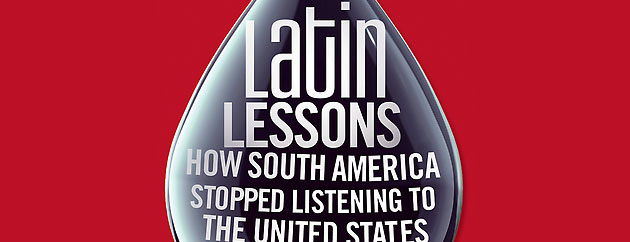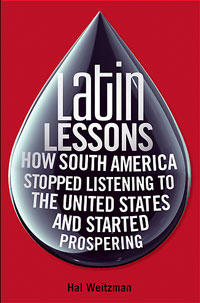
The New El Dorado or a Commodity Bubble
14 May, 2012Hal Weitzman’s Latin Lessons – How South America Stopped Listening to the United States and Started Prospering is a sane, measured and humorous take on a serial underperformer. Or is it? It isn’t immediately clear whether South America “stopped listening” or whether it was no longer “forced to hear”.
A place less ordinary
Weitzman injects some interesting tableaux into the mix. The old style Latin American rulers – a rich mixture of assassins, toys soldiers, plutocratic carpet-baggers or stuffed shirt hidalgos – aren’t a patch on the new lot. A president in a red beret bedecked in the national colours with a complimentary beret-wearing green parrot on his arm? That’s new. Welcome to Chávez’s Venezuela!
Evo Morales, president of Bolivia, cuts a similar dash in his alpaca tank top. Weitzman’s description of Morales as looking like a “Lego man” is not wide of the mark. Aside from his squat appearance, the copious centre-parted hair and a face that wouldn’t look out of place on a Moche pot – everything looks like he could easily be disassembled. However, the rapidity with which Morales came from the streets into power has outstripped his understanding of protocol which he admitted on a trip to China. It is indicative of attitudes old and new, though, that the old Castellano masters (in the guise of Spain’s ABC and El País) took offence. Where was his Ferrero Rocher “ambassadorial” chic?
Vote for me – I’ll do something!
Weitzman plots the course of Morales and others from political irrelevance to forces powerful enough to overturn the European and Creole elites who ran some of these countries as feudal fiefs – a long way from God but close enough to Miami for some R&R. Meanwhile back at the rancho the bus fares were prohibitive and the water undrinkable.
The bottom up movements which changed the political scene often resulted from street power exerting itself over precious resources (water in Cochabamba, Bolivia) or the tendency for neo-liberal economic policies to further impoverish the already abject poor, as in the example of the Caracazo in Venezuela in 1989, when a rise in bus prices prompted civil unrest and led ultimately to the appearance of Chavismo.
Coca loca
Weitzman, a former Financial Times man in the Andes, describes the disjuncture between the city and the countryside; the indigenous and the colonial. The rancho city of El Alto and La Paz, its colonial counterpart, are different worlds – almost different planets.
When the coca-chewing Aymara and Quechua-speaking people of the Altiplano come up against the modern world there is incomprehension. The Andean republics are tired of helping the US deal with its addiction to a bastardised version of a stimulant they’ve been using since before the Americas said “hello” to Columbus. They make tea out of it and chew in order to live and work at altitude.
Weitzman wonders wearily why the US doesn’t decriminalise cocaine and deal with consequences. The locals don’t see it as their business.
One size fits all
The IMF, World Bank and US feature in the 90’s attempt to make the continent in their image. The Washington Consensus, which Weitzman describes as an “unfortunate name in Latin America”, was a catalogue of economic mismanagement. By the time they’d lowered taxes, opened up trade, reduced the size of government and privatised – the economy was depressed, the stellar rich, richer, unemployment higher and the poor, poorer.
Weitzman is good on the endemic problems of corruption and mismanagement; ineffectual political and economic systems, and differences between the city and the country, but he is less good on how commodity-based economies are supposed to benefit – and more importantly develop – when competing against subsidised “free-marketers” (EU and US) and the Chinese bearing gifts.
While the going is good
The salvation, if that’s what it is, came from the insatiable demand for commodities – in which Latin America is rich – from the US (Venezuelan oil), China, India, Russia, Iran, etc. There is nothing new about commodity-based economies in the region – they all are.
Weitzman notes that growth post-Lehmann, has been impressive: Paraguay 10%, Venezuela 9%; Peru 9%, Brazil 8% and Argentina 8%. Employment has risen by 7.6% across the region.
The nationalisation of strategic assets is one strand in the region’s rethink of how it does business. Repatriating profits and taking a control of strategic interests is being used to bank roll some of the social changes being implemented. Poverty at last is in decline. The impetus for these changes comes from the emergence of left-of-centre populist nationalist politicians like Chávez (Venezuela), Correa (Ecuador), Morales (Bolivia) and Humala (Peru) and is predicated on the commodity boom.
Res non verba – deeds not words
Weitzman shows that with discernible changes to people’s lives not only can these politicians be re-elected they can achieve folkloric status. People will even tolerate their six hour speeches and TV extravaganzas. It may seem difficult to believe but the health and literacy campaigns introduced by Chávez and Morales – with Cuban assistance – would have been unheard of under previous leaders.
How long is a piece of democracy?
Weitzman believes the US has taken its eye of the ball in the Americas. In years gone by the marines would swarm ashore quicker than you could say “representative democracy”. Times have changed, though, and there are “keep out” signs all over South America (bar Colombia). Has US policy changed or merely the circumstances?
Weitzman mentions that the US’ tentative support for the anti-Chávez coup in 2002 became a stick with which to beat it and President G. W Bush.
An ear trumpet for Uncle Sam
The book ends with an appeal to the US to see itself not as a master but part of the main. The enmity towards the US, as Weitzman explains, is real and visceral and even if it wanted to change its tune there are those in South America who would prefer a coalesce of la Comunidad Andina (Bolivia, Colombia, Ecuador and Peru) with Mercosur/Mercosul (Argentina, Brazil, Paraguay and Uruguay) before anything involving Uncle Sam.
It’s a long way from Galtieri…
 What Weitzman argues is that the US could take practical steps such as turning the School of the Americas in Panama – whose alumni include Pinochet, Ríos Montt, Galtieri, and Banzer – into an educational establishment to train people in the law, journalism and humanities rather than a production line for the next spanner. It could help the region to develop a competitive industrial capacity and provide expertise to ease and spur Pan-American trade and diversification. But will it?
What Weitzman argues is that the US could take practical steps such as turning the School of the Americas in Panama – whose alumni include Pinochet, Ríos Montt, Galtieri, and Banzer – into an educational establishment to train people in the law, journalism and humanities rather than a production line for the next spanner. It could help the region to develop a competitive industrial capacity and provide expertise to ease and spur Pan-American trade and diversification. But will it?
The US likes a democracy just so long as the result suits it. This aide memoire is not lost on the Latin American leaders but the local take on democracy Chávez-style, in particular, is a bit like constitutional Chase the Lady. Yes – it is democracy – but often not as we know it.
Societies in which democracy is often merely a label can’t be expected to function like those where it is has evolved with the checks and balances necessary to make it work. That’s even true when they aren’t subject to outside interference. Whatever the future, the US could do worse than taking Weitzman’s advice.
Latin Lessons – How South America Stopped Listening to the United States and Started Prospering by Hal Weitzman is published by John Wiley & Sons and available from Amazon
Follow Sounds and Colours: Facebook / Twitter / Instagram / Mixcloud / Soundcloud / Bandcamp
Subscribe to the Sounds and Colours Newsletter for regular updates, news and competitions bringing the best of Latin American culture direct to your Inbox.

